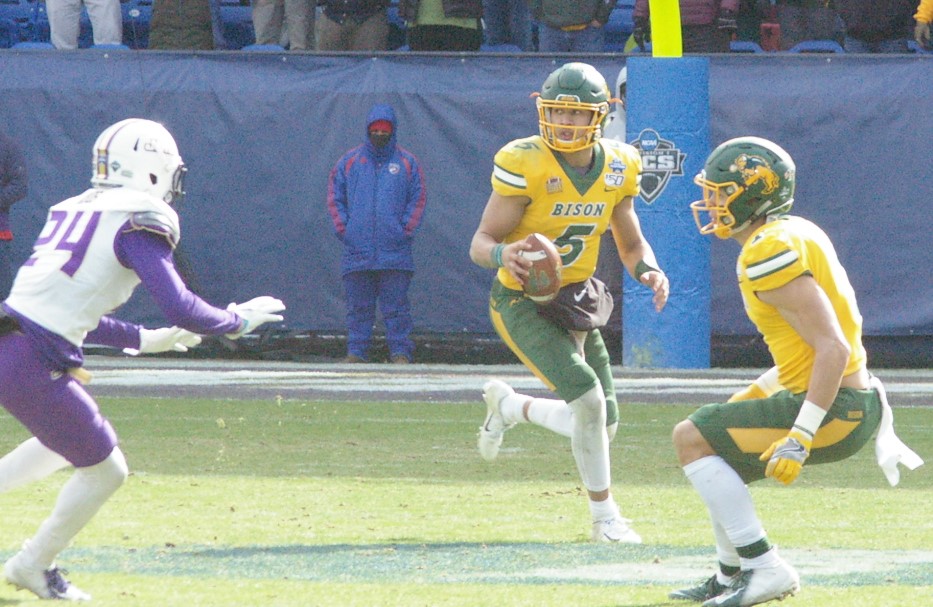OPINION: Watch Out, North Dakota State: The Big 10 Is Coming For Your Trey Lance With Their Proposed One Time Transfer Rule

Fans of North Dakota State football are spending this offseason reveling in their eighth FCS National Championship this decade.
That championship came thanks to the emergence of freshman QB Trey Lance having an epic undefeated season, with a stat line that any Division I football school would drool over – 28 passing TDs, 14 rushing TDs, 0 interceptions in 15 games.
If the Big 10 and the Power 5 have their way, however, the Trey Lance’s of the world won’t be sticking around at FCS schools like North Dakota State for very long.
Per Dennis Dodd of CBSSports.com, the Big Ten quietly proposed legislation last year that would allow players in every sport to transfer once in their collegiate careers without sitting out a year at their new school. This affects football, men’s and women’s basketball, baseball, and hockey.
You ought to know that the purpose of this legislation isn’t fairness, equality, or competitiveness. It’s goal is to allow the Big 10 to poach players like Trey Lance earlier than their senior year.
Lock Up Your Star Players
You will hear lots of flowery language from the Big 10 and the NCAA about fairness – about how it’s supposedly unfair for kids in football and men’s basketball to be able to transfer from one school to another without sitting out a year. How it’s allowed in other sports. How it disproportionately affects non-white athletes. How the waiver process is “unpredictable”.
You ought to know that this is a line of bullcrap.
Immediate transfers are allowed in other NCAA sports because those sports don’t have millions dollars of TV rights on the line if they are successful. In men’s basketball, a once-in-a-generation C.J. McCollum-like college player transferring from Lehigh to, say, Kansas can be the difference between a first-round upset and a Final Four bid. The return on that ability for the Power Five schools is enormous.
Worse, if generational talents like Trey Lance do transfer from North Dakota State to, say, Michigan, the school that identified the talent and developed that talent don’t get anything in return from Michigan. Jim Harbaugh could tweet out that he’s “looking for a quarterback from the area”, Lance could transfer in April, and then suddenly North Dakota State is out a starting QB without the ability to recruit another high school QB in his place.
Don’t the Bison deserve the right to have the services of that player for at least until they graduate from the school? Or at least get some benefit for being great at recruiting talent, only to have it stolen from them?
Destabilizing Mid-Major Football And Basketball
The NCAA is allegedly supposed to protect to some degree its broader membership from Power Five schools throwing their money and influence around to just suck up all the talent. This “one time free agency” rule would do just that – make every mid-major a farm team for the Power Five schools in all the major revenue sports.
The effect on non-Power Five athletics could be devastating.
Football is as much about systems as it is about stars. High school athletes are attracted to North Dakota State because they have a system – physical play, a balanced rushing and passing attack, and an aggressive defense – where players develop for four eligible years.
But free agency wrecks this model.
Your lightly-recruited sophomore LB comes out of nowhere to gain 25 lbs and lead the team in tackles? Minnesota needs depth at LB. An offensive lineman from a small high school develops into a second team all-League player in his sophomore year? Wisconsin’s right tackle got hurt in the spring… why not just sign one from the Bison?
This will be a disaster for good FCS schools, who will be under even more pressure to play even more freshmen and sophomores in position to play before they’re ready. It won’t just be the Trey Lance’s of the world – there will be more freshman and sophomore on the squad to get playing time, so they don’t get cold feet and go somewhere else. FCS teams could more resemble junior college football teams than what we know as Division I football teams today.
The graduate transfer rule, on which this is based, at least had the benefit of the fact that a student would have at least earned their degree from the school in question. Eastern Washington fans were unhappy all-Big Sky QB Vernon Adams left after three years of eligibility, but it was hard to argue it wasn’t in his best interest to transfer since he had earned his degree already. It also acted as a limit so that the rule wasn’t abused – at best, a school would only have their services for one season.
But this proposed rule is the graduate transfer rule on steroids. There are no restrictions on earning a degree – only maintaining “academic eligibility” and “academic progress”, which would be required for athletes to be able to play on the team anyway. These are laughably light restrictions.
In men’s basketball, too, this would accelerate an already-destabilized transfer market and make every player on a postseason all-Conference team the subject of recruiting by Power 5 schools.
Mid-Majors Should Get Something
Mid-major schools should not let this go without a fight. They should approach this as an attack on the success of their teams, which it is. Any smokescreen talking about equality or fairness should be brushed away. This is about Power Five teams’ ability to stockpile more talent and recruit college sophomores.
Mid-majors should have protections that allow them to preserve their homegrown talent. If a Power Five school absolutely must have Trey Lance, have the schools that developed that talent get some sort of compensation in return.
There needs to be some way to discourage Power Five schools to just stockpile talent to both strengthen their own teams and weaken the Group of Five and FCS schools in their region.
And the smaller schools the Big 10 are targeting should see this as an existential threat to their schools, because that’s exactly what it is.

Chuck has been writing about Lehigh football since the dawn of the internet, or perhaps it only seems like it. He’s executive editor of the College Sports Journal and has also written a book, The Rivalry: How Two Schools Started the Most Played College Football Series.
Reach him at: this email or click below:
